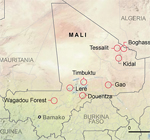French take another Mali town
Thursday, January 31, 2013
SEVARE, Mali — French forces met no resistance Wednesday in Kidal, the Islamists’ last major town, as the 2-week-old mission scored another success in its effort to dislodge the al-Qaida-linked militants from northern Mali.
The capture of Kidal came just days after French and Malian forces retook two other provincial capitals - Gao and Timbuktu - that also had been under harsh Islamic rule for nearly 10 months.
“Nobody questions France’s rapid deployment but the ability to hold on to the cities and territory is an immense challenge. It is not clear how they will be able to sustain the recent gains,” said Alex Vines, head of the Africa program at Chatham House.
“The Islamist extremists have not been defeated; they have melted into the heat haze of the desert.”
Many fear the Islamists now will attempt to hide among civilian populations in small outlying villages, only to return and attack the weaker African forces once the French are gone.
The Islamists are believed to have an elaborate system of caves and other desert hide-outs that they have constructed over the past year as momentum for a West African regional military intervention stalled.
The Islamist fighters fired on French forces when they arrived in Gao, though the militants had deserted Timbuktuby the time forces arrived there Monday, damaging the airport’s runway in acts of vengeance as they fled.
Haminy Maiga, the interim president of the Kidal regional assembly, said French forces also met no resistance when they arrived late Tuesday in Kidal.
“The French arrived at 9:30 p.m. aboard four planes, which landed one after another. Afterwards they took the airport and then entered the town, and there was no combat,” said Maiga, who had been in touch with people in the town by satellite phone as all the normal phone networks were down.
“The French are patrolling the town and two helicopters are patrolling overhead,” he added.
In Paris, French army Col. Thierry Burkhard confirmed that the airport was taken overnight and described the operation in Kidal itself as “ongoing.” France’s defense minister said bad weather was hampering the troops’ progress out of the airport.
Maiga said fighters from the National Movement for the Liberation of Azawad - a secular Tuareg group that once battled alongside the Islamists for control of the north - had left Kidal as of Wednesday. Azawad is what the Tuaregs call their homeland in northern Mali.
France, the former colonial ruler, began sending in troops, helicopters and warplanes on Jan. 11 to turn the tide after the armed Islamists began encroaching on the south, toward the capital. French and Maliantroops seized Gao during the weekend, welcomed by joyous crowds. They took Timbuktu on Monday.
“Now it’s up to African countries to take over,” French Foreign Minister Laurent Fabius told Le Parisien newspaper. “We decided to put the means - in men and supplies - to make the mission succeed and hit hard. But the French aspect was never expected to be maintained. We will leave quickly.”
In Gao’s main market, thousands of women returned to work Wednesday without the black veils required by the Islamists. They wore vibrant patterned fabrics and makeup.
“We are free today, we are free,” said Fatima Toure, a Gao resident.
Back from exile, the mayor and governor of Gao met with community elders to chart the best measures for returning life to normal.
The elders presented two cows to the authorities and a representative of the French army in gratitude for their work in liberating Gao.
While most crowds in the freed cities have been joyful, months of resentment toward the Islamists bubbled into violence in Gao.
Video footage filmed by an amateur cameraman shows amob attacking the symbol of the extremists’ rule, the Islamic police headquarters.
Some celebrate cheering “I am Malian,” while others armed with sticks and machetes attack suspected members of the Islamist regime. The graphic images shot Saturday show the mob as they mutilate the corpses of two young suspected jihadists lying dead in the street.
Meanwhile, a South African university said Islamist extremists damaged or stole only a limited number of manuscripts in Timbuktu in Mali before they fled the fabled desert city.
People in the north Malian city who have knowledge of the documents reported that there was no malicious destruction of any library or collection, said the University of Cape Town, which helped fund a state-of-the-art library to house manuscripts.
“The custodians of the libraries worked quietly throughout the rebel occupation of Timbuktu to ensure the safety of their materials,” said the university.
The university said that a report from Britain’s Sky News that 25,000 manuscripts had been burned was false. Other news reports quoted the city mayor, who wasn’t in the city, saying manuscripts had been destroyed, the university said. Information for this article was contributed by Andrew Meldrum, Baba Ahmed, Lori Hinnant, Andrew Drake, Jerome Delay and Peter James Spielmann of The Associated Press.
Front Section, Pages 5 on 01/31/2013
